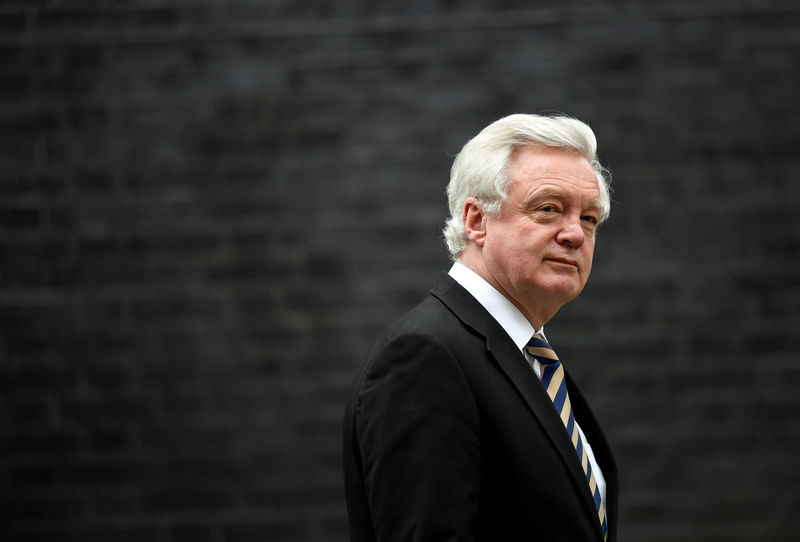LONDON (Reuters) - David Davis thrust Prime Minister Theresa May's government into crisis by resigning as Brexit negotiator and publicly denouncing her strategy as a betrayal of voters' wishes that risked undermining British interests.
What happens next? Following are some scenarios.
REVOLT?
May's survival will depend on keeping other senior cabinet ministers in the government. All eyes are on Foreign Secretary Boris Johnson, who is due to speak at a diplomatic conference later on Monday, and Environment Secretary Michael Gove.
When Davis was asked if he would join some other lawmakers in calling for May to stand down, Davis told BBC Radio: "I won't be one of them. I won't be encouraging people to do that, I think it's the wrong thing to do."
The resignation of Davis's deputy, Steve Baker, is a serious loss for May: Baker is widely respected among Brexit-supporting lawmakers.
Jacob Rees-Mogg, the leader of a group of Brexit supporters in the Conservative Party, signalled that he would not vote for May's plan, apparently agreed by the cabinet at Chequers on Friday, if it came to a vote in parliament.
Brexiteers cast her proposals as a "worst-of-all-worlds 'Black Hole' Brexit where the UK is stuck permanently as a vassal state in the EU’s legal and regulatory tar-pit."
May is due to meet her lawmakers later on Monday.
"A wider rebellion, a leadership challenge, early elections and possibly another major shift in the Brexit strategy (either way) cannot be ruled out," Citi said in a note to clients.
SOFT BREXIT?
If Davis and Baker are the only major losses from the government over her plan for "a business-friendly" Brexit that proposes "a free trade area for goods" with the EU, then May will be much safer.
Davis resigned because he did not agree with a policy which effectively kept Britain so close to the EU's orbit. Major international businesses such Siemens, Airbus and BMW have called for a close post-Brexit relationship.
Sterling rallied on Monday as traders bet that the resignation of Davis would not endanger the prime minister and instead focused on the government's newly-announced plan that markets believe makes a "soft Brexit" more likely.
The pound gained as much as half a percent to $1.3363, its best level since June 14.
May appointed Dominic Raab, who voted for Brexit in the 2016 referendum, as the new Brexit Secretary on Monday, just hours after Davis's resignation.
Facing a deeply divided government, party and country, May sought to find a compromise between Brexiteers and Remainers, who fear the economy will be damaged by cutting too many ties with the world's biggest trading bloc.
LEADERSHIP CHALLENGE?
Ever since May's botched bet on a snap election in 2017 lost her party its majority in parliament, she has been vulnerable but there are few candidates who could unite her divided party.
The 30-year schism inside her party over Europe helped sink the premierships of Margaret Thatcher, John Major and David Cameron.
Conservative lawmakers also worry that leadership election so close to Brexit - due to take place on March 29, 2019 - would embolden Labour and increase pressure for another election which could delay Brexit.
A leadership challenge can be triggered if 15 percent of members of parliament in May's Conservative Party write a letter to the chairman of the party's so-called "1922 committee".
The Conservatives currently have 316 members of parliament (MPs) so 48 of them would need to write such letters to challenge May.
For many Conservative supporters of Brexit, though, May has sold out and they do not want her to lead the party into the next election, which is due on May 5, 2022.
DISORDERLY BREXIT
Under this scenario, May's government either falls or fails to reach a Brexit deal with the EU.
A precursor to this could be the government losing the vote it has promised parliament on the final exit deal. Whilst that vote is not binding, May's position would be badly weakened if parliament rejected her deal.
Amid the turmoil, Britain drops out of the EU with no proper deal.
A disorderly Brexit would spook financial markets, tarnish London’s reputation as one of the world’s top financial capitals and sow chaos through the economies of Britain and the EU by dislocating trading relationships.
ANOTHER REFERENDUM?
May has repeatedly ruled out another referendum, but about 100,000 supporters of the EU marched through central London last month to demand that the British government hold a final public vote on the terms of Brexit.
In the June 23, 2016 referendum, 17.4 million voters, or 51.9 percent, backed leaving the EU, while 16.1 million voters, or 48.1 percent, backed staying.
Former Prime Minister Tony Blair has repeatedly called for reversing Brexit, echoing other critics such as French President Emmanuel Macron and billionaire investor George Soros, who have suggested that Britain could still change its mind.

In one of the most tumultuous periods in recent British political history, there have been four major elections in the past four years: the Scottish independence referendum of 2014, the 2015 UK election, the 2016 Brexit referendum and the snap election called by May last year.